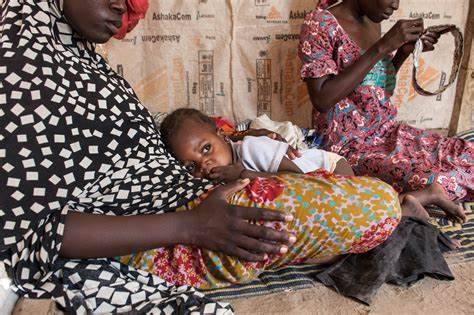At the age of 11, Tabata was compelled by her father to wed the son of a family acquaintance in Gwoza, Borno State, northeastern Nigeria. She endured years of physical and emotional maltreatment from her husband.
“Following marriage, I endured physical violence and assault from my husband during our disagreements,” she recounted. “Following the initial day, we became intimate; I experienced significant bleeding, leading me to believe I might lose my life.” I sustained vaginal tears, necessitating that his mother, Jimzob, accommodate me in her room until my recovery was complete.
After several weeks, Jimzob requested Tabata to return to her husband’s room, as he had ceased communication with her and threatened severe repercussions if she did not reconcile with him.
I have experienced vesicovaginal fistula since the inaugural year of my marriage. It has stayed steady to this day. “It deteriorates during my pregnancies,” Tabata stated. A vesicovaginal fistula (VVF) is an anomalous connection between the bladder and the vaginal wall. Numerous women globally suffer from this illness, although those in underdeveloped nations experience the most significant burden, frequently undergoing substantial emotional distress.
Escaping Gwoza to encounter further difficulties
Following the Boko Haram assault on Gwoza, Tabata was had to evacuate her residence with her husband and three children to find sanctuary in Adamawa State. Her husband subsequently deserted her and their six children, leaving Tabata diminished in spirit. She has compelled her children to live on the streets, while her divorced husband intermittently returns without providing assistance.
I previously accompanied acquaintances to residences to perform household tasks for a monthly remuneration of ₦5000, which was insufficient to fulfil the daily necessities of myself and my children. I obtained another position selling rice grains for a woman with a substantial supply. I earned between ₦200 and ₦500 daily.
“While it may be minimal, we frequently receive grains from benevolent neighbours and other philanthropists within the community.” We pay little attention to oil or tomatoes; we simply include salt and pepper into our meals, which suffices for our consumption. I previously purchased charcoal or firewood for cooking, but it has now become prohibitively expensive. Tabata stated, “My children collect the seeds of doum palm fruits and other plastic waste from the community, which we utilise for cooking energy.”
Just when she believed her misfortunes could not escalate, fate dealt her another unfortunate circumstance a few months prior.
“One day, I embarked on a journey to transport rice for my employer from Fufore.” During our return journey, the vehicle malfunctioned on a desolate road. As darkness approached, the motorist sought assistance from a nearby village. There were three women and three guys. It seems possible they were acquainted, however they ultimately assaulted both of us while the other woman fled.
Subsequent to that evening, Tabata was unable to disclose her narrative to anybody and returned home consumed by wrath and pain. Life must continue, and despite her first difficulty in coping, she needed to overcome the tragic occurrences to support her children.
I strove to manage the circumstances I faced, yet I continued to fall ill. The situation was dire, and I lacked the financial means to seek medical attention. “I would encounter a girl who works at the pharmacy near my residence to provide me with medications on credit, and occasionally she would need to administer intravenous fluids,” she added.
A acquaintance who is well-acquainted with her remarked, “Tabata has consistently been very talkative and vivacious since I met her.” Recently, I observed her demeanour to be notably quiet and restrained. After she fell ill repeatedly, I began to suspect that she had been exposed. I persuaded her to have a test at the pharmacy, and the pharmacist verified that she was really pregnant.
Her companion confirmed that she had lost all vitality in recent weeks and was perpetually in a melancholic state.
“I am uncertain how to address my present situation, but I cannot retain this child.” Tabata stated, “My husband could return at any moment, and if he discovers this, he will undoubtedly kill me, or worse, he will tarnish my reputation among his acquaintances until the ensuing shame drives me to suicide.”
When enquired whether she had attempted to divorce from her husband, Tabata responded, “I conferred with the community leader here in Waurro Jabbe.” He expressed empathy and pledged assistance should I choose to separate. He stated that I may contact him at any time to organise guards to apprehend my husband throughout the proceedings. However, he cautioned me on the repercussions: in the absence of a spouse, I would become susceptible to other men, and my children would endure the absence of a father. Upon reflection, I concluded that it is preferable to maintain the facade of a spouse, despite his irresponsibility.
The World Health Organisation reports that roughly 35 percent of women globally have encountered sexual violence. Victim blaming, a prevalent strategy, persists in silencing and discrediting survivors.
Zainab, now in her late thirties, has endured the trauma of forced marriage and persistent rape by her husband, and she is compelled to live in shame and concealment for a crime perpetrated against her. Sexual gender-based violence persists and is widespread in Nigeria’s North East, necessitating a multimodal strategy that involves both men and women while fostering education, awareness, and empathy.
If you or anyone you know have been affected by the people highlighted in this article, then please report those individuals to the Police on 101 (999 if an emergency) or visit their online resources for further details of the options for reporting a crime. You can also make a report at Crimestoppers should you wish to be completely anonymous. There is help available on our support links page.

